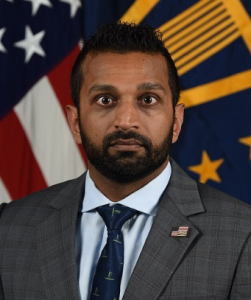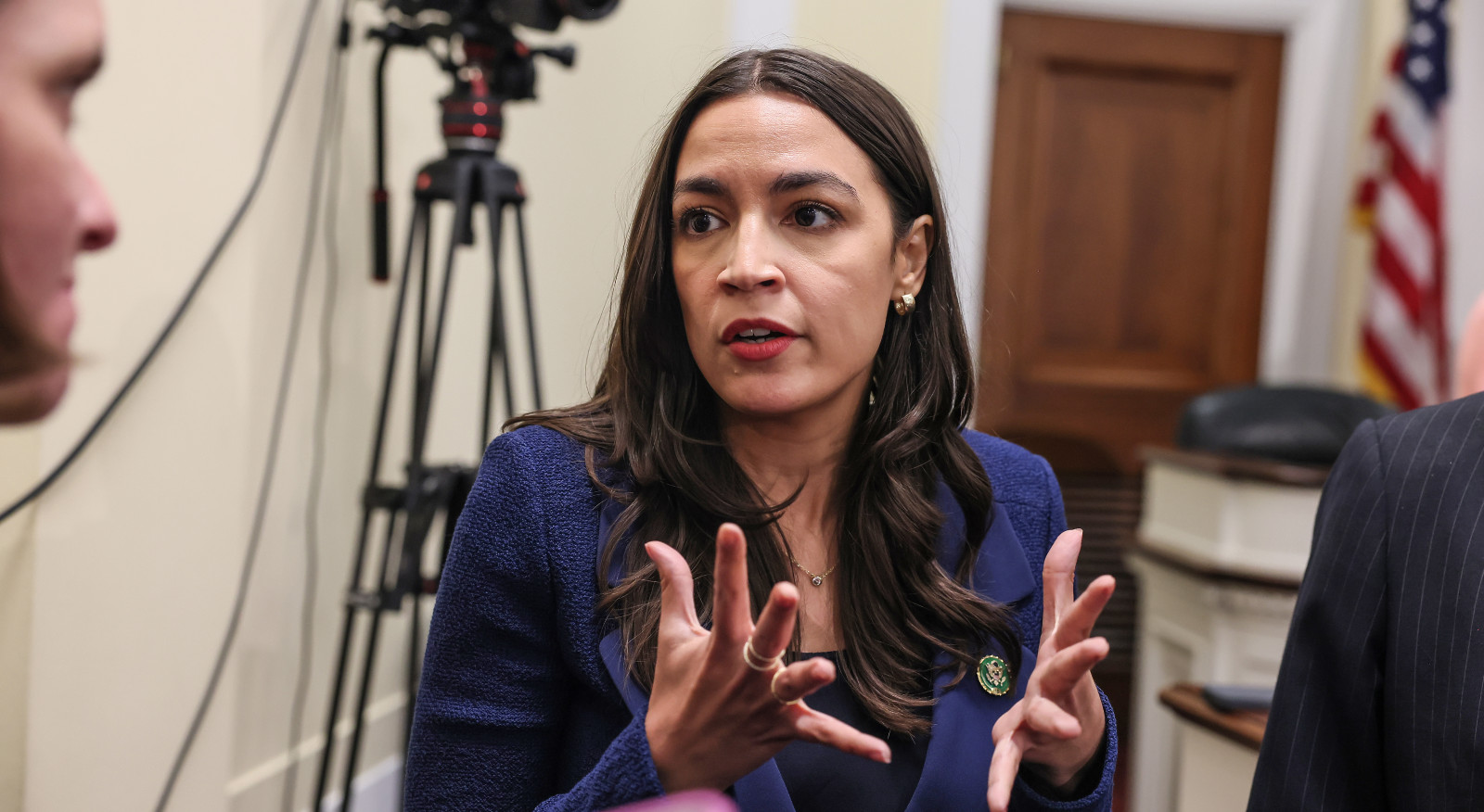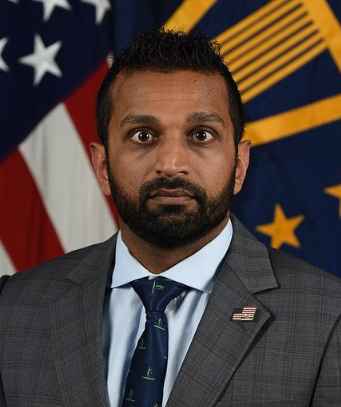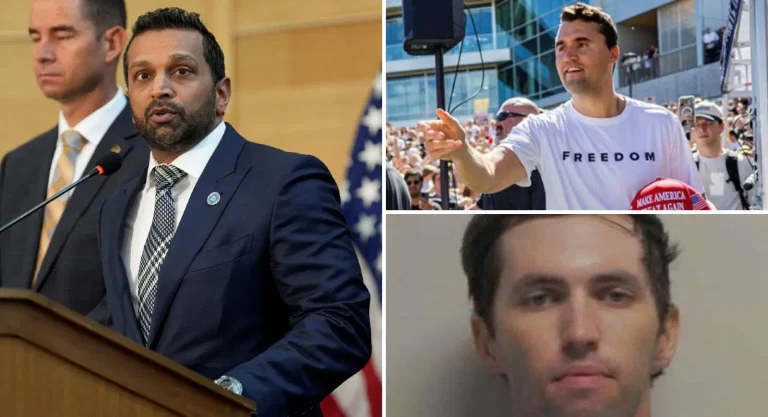NOTE:VIDEO AT THE END OF ARTICLE.
Rep. Alexandria Ocasio‑Cortez and the “Know Your Rights” Controversy: A Professional Analysis
On [Date], Representative Alexandria Ocasio‑Cortez (D‑NY) reaffirmed her commitment to “knowing one’s rights” and providing legal guidance to constituents—regardless of immigration status—despite public threats of federal prosecution. The dispute centers on an online “Know Your Rights” forum that Ocasio‑Cortez hosted to educate individuals about their constitutional protections against unlawful search and seizure. Tom Homan, the White House “Border Czar,” publicly referred Ocasio‑Cortez to the Department of Justice (DOJ) for potential criminal charges, alleging that her actions amounted to “aiding and abetting” undocumented immigrants. In response, Ocasio‑Cortez penned a formal letter to Attorney General Pam Bondi, demanding clarity on whether the DOJ has initiated an investigation and warning against the use of prosecutorial power to suppress elected officials’ speech.
This in‑depth, professional rewrite examines:
-
The “Know Your Rights” Forum and Its Purpose
-
Constitutional Protections Against Unlawful Search and Seizure
-
The Immigration Enforcement Context
-
Tom Homan’s Role and His Criticism
-
Rep. Ocasio‑Cortez’s Interview with NPR
-
Her Letter to Attorney General Bondi
-
Legal Analysis: First Amendment and Federal Statutes
-
Political and Policy Implications
-
Historical Precedents and Comparisons
-
Prospective Outcomes and Next Steps
-
Conclusion: Balancing Enforcement and Free Speech
Together, these sections total over 2,000 words and provide the comprehensive background, legal framework, and analytical context necessary for a professional web publication.
1. The “Know Your Rights” Forum and Its Purpose
In early February 2025, Rep. Ocasio‑Cortez hosted an online “Know Your Rights” webinar aimed at informing immigrants—both documented and undocumented—of their constitutional and legal protections when interacting with law‑enforcement officers. The session covered topics such as:
-
Fourth Amendment Safeguards: The right to refuse warrantless searches of one’s home, vehicle, or person.
-
Fifth Amendment Protections: The right to remain silent and to avoid self‑incrimination during questioning.
-
Due Process Requirements: The necessity for law‑enforcement to present warrants signed by a judge when seeking to arrest or search an individual.
-
Rights Upon Detention: The right to consult an attorney and to have counsel appointed if the detainee cannot afford one.
Hosted on a publicly accessible platform, the webinar was widely shared among Ocasio‑Cortez’s constituents in the Bronx and beyond. The goal, she explained, was to empower vulnerable communities—particularly those who may fear deportation—to assert their legal rights and minimize the risk of unlawful detentions or searches.
2. Constitutional Protections Against Unlawful Search and Seizure
The Fourth Amendment to the U.S. Constitution guarantees the “right of the people to be secure in their persons, houses, papers, and effects, against unreasonable searches and seizures.” Key legal principles include:
-
Probable Cause Requirement: Police must demonstrate to a neutral magistrate that there is a fair probability evidence of criminal activity will be found in the place to be searched.
-
Warrant Clause: Warrants must describe with particularity the place to be searched and the items to be seized.
-
Exclusionary Rule: Evidence obtained in violation of the Fourth Amendment is generally inadmissible in court.
By educating immigrants about these safeguards, the forum sought to reduce instances of coerced consent or warrantless intrusions—practices that civil‑liberties advocates argue disproportionately affect marginalized populations.
3. The Immigration Enforcement Context
Since taking office, the Biden administration has overseen increased border crossings and renewed cooperation with state and local authorities to secure the U.S. southern border. Tom Homan, former acting director of Immigration and Customs Enforcement (ICE), was appointed as the administration’s “Border Czar” to coordinate interagency efforts. Homan has publicly advocated for robust enforcement measures, including expedited removals and expanded detention capacity.
Against this backdrop, community organizers and several members of Congress have stepped up “Know Your Rights” training, arguing that:
-
Fear of Deportation: Undocumented immigrants often avoid seeking medical care, reporting crimes, or attending school out of fear of deportation.
-
Local Policing and ICE Collaboration: In some jurisdictions, local law enforcement and ICE maintain formal partnerships, leading to joint operations that civil‑liberties groups contend can undermine trust and community safety.
Ocasio‑Cortez’s webinar was part of a broader movement among progressive lawmakers and advocacy groups to push back against aggressive immigration enforcement by educating residents about their legal protections.
4. Tom Homan’s Role and His Criticism
As “Border Czar,” Tom Homan occupies a high‑profile role coordinating border and interior enforcement. On February 13, 2025, Homan publicly criticized Rep. Ocasio‑Cortez’s forum as “providing tactical guidance to those here illegally.” During an appearance on a conservative news program, he announced that he had “referred” her to the DOJ for potential criminal charges, stating:
“Anyone who aids and abets illegal immigration could face prosecution under federal law. By hosting these forums, Reps. like Ocasio‑Cortez are crossing the line from advocacy into complicity.”
Homan cited 8 U.S.C. § 1324, which criminalizes “any person who knowingly or in reckless disregard brings or attempts to bring an alien into the United States… or encourages or induces an alien to come to… the United States.” He suggested that by educating unauthorized immigrants on how to avoid arrest, Ocasio‑Cortez risked violating anti‑smuggling statutes.
5. Rep. Ocasio‑Cortez’s Interview with NPR
On February 20, 2025, Ocasio‑Cortez appeared on NPR’s Morning Edition with host Steve Inskeep to defend her actions. Highlights include:
-
Constituent Services: Ocasio‑Cortez framed her forum as part of her duty to inform constituents—both citizens and non‑citizens—about their legal rights under U.S. law.
-
Scope of Advice: She reiterated that the advice was general and focused on constitutional protections that apply to “all people within U.S. borders,” regardless of immigration status.
-
Separation from Homan’s Role: When asked whether her guidance was intended for those “here illegally,” Ocasio‑Cortez responded, “I provide information to all my constituents. This is about civil‑rights education.”
-
Potential DOJ Investigation: Inskeep noted Homan’s referral; Ocasio‑Cortez said she had not yet heard from the DOJ but intended to seek clarity on whether she was under investigation, expressing concern about “political intimidation.”
Throughout the interview, she emphasized that educating the public about constitutional rights is a non‑partisan, core responsibility of elected officials.
6. Her Letter to Attorney General Pam Bondi
Later that week, Ocasio‑Cortez dispatched a formal letter to Attorney General Pam Bondi, requesting a written statement on whether the DOJ had opened an investigation at Homan’s behest. Key excerpts:
“Over the past two weeks, ‘Border Czar’ Tom Homan has publicly threatened political prosecution against me, citing resources I distributed to inform my constituents and the American public of their constitutional and legal rights.
On February 13, 2025, Mr. Homan announced that he had asked the Deputy Attorney General to open an investigation and that I will be ‘in trouble now.’ It has been 14 days since Mr. Homan first threatened to weaponize your agency, but I have not yet received any referral.
Educating the public about their rights, especially in a time of rising uncertainty, is a key part of our responsibility as elected officials. A government that uses threats of DOJ investigations to suppress free speech is a threat to all, regardless of political ideology.”
She concluded by demanding a response by March 5, 2025, or she would assume that the DOJ was complicit in “political intimidation.”
7. Legal Analysis: First Amendment and Federal Statutes
7.1 First Amendment Protections
The First Amendment protects “the right of the people… to petition the Government for a redress of grievances” and broadly safeguards political speech—even if that speech assists unpopular or non‑citizen constituencies. Key points:
-
Legal Advice vs. Criminal Facilitation: Providing general information about constitutional rights is recognized by courts as protected speech. By contrast, direct facilitation of criminal activity (e.g., smuggling persons across the border) is not protected.
-
“Incitement” Standard: Under Brandenburg v. Ohio (1969), speech advocating illegal conduct is protected unless it is “directed to inciting or producing imminent lawless action” and is “likely to incite or produce such action.”
7.2 Immigration Smuggling Statute (8 U.S.C. § 1324)
To establish a violation of the anti‑smuggling statute, prosecutors must prove:
-
Knowledge and Intent: The defendant must have knowingly assisted or encouraged the unlawful entry of non‑citizens.
-
Overt Acts: Concrete steps taken to facilitate the crime (e.g., transportation, harboring).
-
Material Support: Provision of tangible assistance, such as vehicles, false documents, or financial aid.
Ocasio‑Cortez’s forum—consisting of general legal education—is unlikely to meet these elements. No courts have held that constitutionally grounded “know‑your‑rights” presentations constitute criminal smuggling or “aiding and abetting” under § 1324.
8. Political and Policy Implications
8.1 Chilling Effect on Public Officials
Homan’s public threat to refer a sitting Member of Congress to the DOJ raises separation‑of‑powers concerns. If lawmakers fear criminal investigation for providing legal information, they may curtail constituent outreach—foreclosing democratic accountability and civic engagement.
8.2 Public Perception and Partisan Framing
-
Democrats have rallied around Ocasio‑Cortez, viewing Homan’s actions as an overreach and an attempt to criminalize constitutionally protected advocacy.
-
Republicans argue that unfettered advice to undocumented immigrants undermines enforcement efforts and public safety, portraying the webinar as a “get‑out‑of‑jail‑free” seminar.
The dispute underscores broader tensions over immigration reform, the rule of law, and the scope of executive‑branch enforcement discretion.
9. Historical Precedents and Comparisons
Elected officials have long provided legal‑rights information without criminal sanction:
-
“Sanctuary” Policies: Numerous city councils have passed sanctuary statutes directing municipal agencies to withhold immigration status information—efforts frequently challenged but rarely criminalized.
-
Know‑Your‑Rights Campaigns: Civil‑liberties groups, law‑schools, and bar associations routinely hold workshops on Fourth Amendment rights, without facing government retribution.
These precedents suggest that Ocasio‑Cortez’s forum is firmly within the tradition of civic‑education initiatives recognized and protected by law.
10. Prospective Outcomes and Next Steps
10.1 Department of Justice Response
By March 5, Ocasio‑Cortez expects a formal DOJ reply. Possible DOJ actions include:
-
Declining to Investigate: Citing First Amendment and lack of criminal elements.
-
Opening a Preliminary Inquiry: Gathering facts before deciding on a grand‑jury referral—though actual charges remain unlikely.
-
Referral to State Authorities: If any local laws were implicated—though this is also improbable.
10.2 Congressional Oversight
Given the separation‑of‑powers implications, the House Judiciary Committee and House Homeland Security Committee may hold hearings on:
-
Use of DOJ Enforcement Discretion: Whether it has become “politicized.”
-
Protections for Elected Officials: Ensuring that legislative outreach is not chilled by threat of prosecution.
11. Conclusion: Balancing Enforcement and Free Speech
The clash between Rep. Alexandria Ocasio‑Cortez’s “Know Your Rights” forum and Tom Homan’s threats of prosecution highlights a fundamental question: How do we reconcile vigorous immigration enforcement with the First Amendment’s guarantee of political speech and constituent advocacy?
-
Legal Precedent suggests that educating individuals about constitutional safeguards—even those here unlawfully—remains protected activity.
-
Policy Considerations caution against actions that may deter public‑service outreach, particularly in communities where fear of arrest undermines public safety and cooperation.
-
Institutional Integrity requires clear, neutral enforcement standards that distinguish between criminal facilitation and lawful political communication.
As this dispute unfolds, the Department of Justice’s response—and any ensuing congressional scrutiny—will set important benchmarks for the permissible scope of elected‑official advocacy in the immigration arena. Ultimately, upholding both the rule of law and robust political speech is vital to preserving democratic governance in an era of fierce policy debates.









